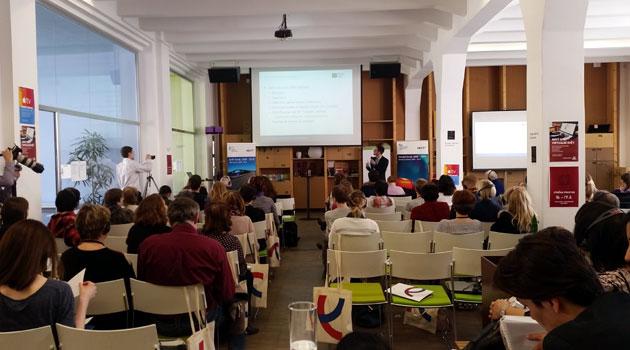International experts: Friendly approach from teachers toward families essential to successful inclusive education

International experts who presented at the recent "School for All" conference in the Czech Republic described several factors key to the success of educating children living with disabilities together with other children. Those factors include collaborating with families, a friendly approach from teachers, the involvement of other experts, emphasis on the progress of each pupil, and the societal perception that the inclusive model o f education is the correct way forward.
One problem with implementing inclusion can be the lack of a clear, shared vision across the political spectrum of the definite direction in which the schools and the education system in general should head irrespective of the larger political situation. One expert emphasizing the importance of communication with families was Allison Collis, a head teacher with an inclusive school in Great Britain called Chestnuts.
Staffers at that school visit the families of children who need support in order to succeed at school. Collis discussed problems with families where nobody has developed any work habits and families who refuse to aid their children with preparing for school at home.
Because of their own bad experiences with education, some adults are afraid to enroll their own children into mainstream schools. However, according to Collis, that can be successfully changed through systematic work.
According to Susanna Rajala of the Finnish National Council on Education, an expert who focuses on Romani children, backup from the family plays an important role. "I think an engaged family is key. They must trust you and they must feel welcomed by the school," she said.
The Scandinavian countries set out on the path of educating all children together after the adoption of the Salamanca Statement in 1994 by the World Conference on Special Needs Education. Those countries also invest significantly more resources into their schools than the Czech Republic does and strive to include children with various problems into mainstream schools irrespective of political changes in government.
"A political agreement exists there that the inclusive approach is the correct one," said Bohumil Kartous of EDUin, the organization holding the conference, who is personally familiar with the education systems of Denmark, Finland, Norway and Sweden. In those countries it is not the rule that all primary school children spend their entire time together in a single classroom.
Frequently a system of special classrooms is used where children living with disabilities spend a minimal part of their instruction time. In Norway, for example, there is no system of publicly-funded special needs schools, but some municipalities have begun establishing them in response to parental demand.
Special educators in Norway have become experts who aid mainstream teachers. Generally their support is provided by working directly in the mainstream schools.
There are also systems developed for including children who speak a different mother tongue from the language of instruction. For example, in the above-mentioned British inclusive school, there are language assistants available for the children.
That particular school has a rather large number of hearing-impaired pupils, so the teachers also know British sign language. From the beginning of their school attendance at the age of four, the hearing schoolmates of the hearing-impaired pupils also learn sign language.
While inclusive education systems have been quite developed in northern Europe, in Germany approximately two-thirds of children with various problems are currently educated separately from the rest of their schoolmates. Expert Christian Johann told the conference that each state in Germany handles inclusion differently.
According to Johann, approximately half of German primary schools take an inclusive approach. The education of all children together in mainstream schools has become a furiously discussed topic in recent weeks and months in the Czech Republic.
In connection with the coming into force this fall of an amendment to the Schools Act that is primarily supposed to change the way schools are financially supported to care for pupils with special needs, concerns have arisen that there will not be enough money provided; that educational-psychological counseling centers, schools and teachers will not be prepared to aid special needs pupils; and that the change will have a negative influence on the quality of education in mainstream schools in cases where more children diagnosed with "mild mental disability" are included in the schools. "Inclusion is a time-tested approach to developing a society, but it is a long-term, perpetual process. The amendment to the Schools Act is the first essential step, but the process decidedly does not end there," Kartous emphasized.